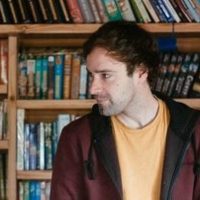
Josh Nadeau
Dialogue facilitator, researcher and writer
| Degrees: | Bachelor of Arts (Honours) with Major in English and a Minor in History, 2010 |
Josh Nadeau is a peacebuilding practitioner interested in bringing people together for dialogue as a response to societal polarization. He’s worked with communities in Ottawa (including in response to the 2022 convoy protests) and abroad (in response to the war in Ukraine). He also worked as a researcher and freelance writer, pulling together gigs as a translator, editor, and journalist until moving into mediation and facilitation full time. He’s an avid hitchhiker, language learner and occasional pilgrim, and often finds himself compulsively documenting the stories of people around him, especially when they’re caught up in complex political histories and narratives. He left Canada (for the most part) in 2012 and has usually lived in the former Soviet Union since then. He moved from focusing on fiction through poetry (during his Carleton undergrad) before settling (for now) into creative nonfiction and research. He’s rather allergic to the idea of putting together a book for the time being.
- Journalism (until Covid): https://joshnadeau.contently.com/
- Scattered peace-related writings: http://www.summerpax.com
- Some dialogue reports: https://www.summerpax.com/kitchentalksreports
How has your Carleton English degree informed your professional and/or creative path?
My English degree was the first time I was expected to write something that wasn’t a story and the first time I was asked to analyze literature. Before that, I mostly wrote stories. I didn’t do a great job in the first couple years, but I remember a moment at the beginning of my third year when it just clicked: how to write essays, make an argument, do the readings. This eventually became my bread and butter when I moved from English teaching (which a lot of backpackers fall into to make money) into freelance writing full time.
I slowly got involved in doing more dialogue work and eventually went back for an M.A. in Conflict Studies (a multi-disciplinary program that includes Psychology, Sociology, History and Politics). Though the focus of this program was on the Social Sciences more than on the Humanities, I love being able to say it all started with the study of literature. At this point I’ve been able to break into big newspapers and do reports for major European bodies, and none of that would have probably happened if I hadn’t, back at Carleton, gotten a taste for how essays work.
Why Carleton? What specific experiences or opportunities did you benefit from while studying English at Carleton?
I was based in Ottawa and couldn’t afford moving to another city and living in residence, so I stuck around. I felt that Carleton was a good spot to study the Humanities (and I liked the campus more). In addition to the attractiveness of the English program, the biggest influence was being able to orbit the folks at In/Words Magazine and Press. Some of those people are also on this alumni wall. While I only ever publish one chapbook with them, the community was on the ball and challenged me to up my game. I had only written stories before that, and during my undergrad I got into poetry. This was one of the community highlights from that period.
While I didn’t keep up with poetry (turned out it was very community-based for me), those folks gave me a sharper eye for my own and others’ work. It also gave me the experience of having people I respect take my work apart in a way that didn’t make me feel small or judged. I’m very happy to see that most of them have seen literary success since then.